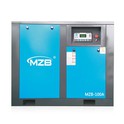As a supplier of Quiet Dental Air Compressors, I often get asked about the noise level standards for these essential pieces of equipment. In the dental industry, a quiet environment is crucial for both patients and dentists. Excessive noise can cause stress and discomfort, which is why understanding the noise level standards is so important.
The Importance of Quiet Dental Air Compressors
Dental procedures can be stressful for patients, and the last thing they need is a noisy air compressor adding to their anxiety. A quiet dental air compressor can significantly improve the patient experience by reducing background noise. This allows dentists to focus on the task at hand without distractions, leading to more precise and efficient treatments.
From a business perspective, a quiet dental office is more appealing to patients. Word-of-mouth recommendations are powerful in the dental industry, and a reputation for a calm and quiet environment can attract more clients. Additionally, a quiet air compressor can contribute to a more pleasant working environment for dental staff, which can improve job satisfaction and productivity.
Noise Level Standards
The noise level of a dental air compressor is typically measured in decibels (dB). The World Health Organization (WHO) recommends that the noise level in a dental office should not exceed 60 dB during normal working hours. This level is considered comfortable for both patients and staff and helps to maintain a calm and relaxing environment.
However, different countries and regions may have their own specific noise level standards. For example, in the United States, the Occupational Safety and Health Administration (OSHA) has set a permissible exposure limit (PEL) of 90 dB for an 8-hour workday. While this standard is more focused on the safety of workers, it also has implications for the dental industry.
When it comes to dental air compressors, most manufacturers aim to produce models that operate at or below 60 dB. This ensures that the compressor does not contribute significantly to the overall noise level in the dental office. Some high-quality models can even operate at as low as 40 dB, which is almost as quiet as a library.
Factors Affecting Noise Levels
Several factors can affect the noise level of a dental air compressor. One of the most significant factors is the type of compressor. Reciprocating compressors, which use pistons to compress air, tend to be noisier than rotary screw compressors. Rotary screw compressors are more efficient and operate more smoothly, resulting in less noise.


Another factor is the size and power of the compressor. Larger and more powerful compressors generally produce more noise than smaller ones. However, advancements in technology have allowed manufacturers to develop high-power compressors that operate quietly.
The location of the compressor can also have an impact on noise levels. Placing the compressor in a soundproof enclosure or a separate room can help to reduce the amount of noise that reaches the dental treatment area. Additionally, proper installation and maintenance of the compressor can ensure that it operates at its optimal noise level.
Our Quiet Dental Air Compressors
At our company, we understand the importance of a quiet dental environment. That's why we offer a range of Quiet Dental Air Compressors that are designed to meet the highest noise level standards. Our compressors are equipped with advanced noise reduction technology, including soundproof enclosures and vibration dampening systems, to ensure that they operate as quietly as possible.
One of our popular models is the 8 Bar High Pressure Oil Free Air Compressor. This compressor offers high-pressure performance while maintaining a low noise level. It is ideal for dental practices that require a reliable and quiet source of compressed air.
Another option is our 3 Cylinder Oil Free Air Compressor. This compressor features a three-cylinder design, which provides smooth and efficient operation. It is also oil-free, which means that it produces clean and dry air, making it suitable for dental applications.
Conclusion
In conclusion, the noise level standard for a quiet dental air compressor is typically around 60 dB or lower. This ensures a comfortable and relaxing environment for both patients and dental staff. At our company, we are committed to providing high-quality dental air compressors that meet these standards. Our range of Quiet Dental Air Compressors offers reliable performance and low noise levels, making them the ideal choice for dental practices.
If you are interested in learning more about our products or would like to discuss your specific requirements, please feel free to contact us. We look forward to helping you create a quiet and comfortable dental environment.
References
- World Health Organization. (2018). Guidelines for community noise.
- Occupational Safety and Health Administration. (2021). Noise standards.






